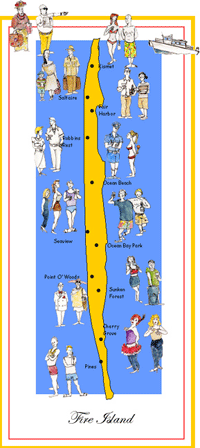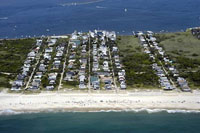Gay Classical Piano Night stars Jacqueline
Jonee & Jean Pierre
by Denise Dell Harbin

The stage of The Community House was graced last weekend with two
virtuoso piano players! Jacqueline Jonée and Jean-Pierre Lemarié treated us to
a Gay Classical Piano Night, following the gay life of Handel, Schubert
and Tchaikovsky with a brilliant script read by Jacqueline, the stage name of
John (Jack) Nieman.
It was more than apropos, as our little theatre was recently
listed on the National Register of Historic Places and America’s oldest
operating Gay Theatre…with gay themes and players since 1948!
Jean Pierre started with Handel’s Chaconne in G Major G229 with
21 variations. He explained that a Chaconne is a musical composition in moderate triple
time typically consisting of variations on a repeated succession. This one had
21 repetitions, yet never sounded repetitious! In Baroque times, these were
accompanied by a dance. Most of us probably just think of Handel as writing the
Messiah, the Christmas staple in music.
What evidence do we have that Handel was gay? Mostly the crowd
he hung out with. And when asked about women, he said “I have no time for
them”.
Next we learned of the gay life of Franz Schubert from
Jacqueline’s slightly naughty narrative and Jean-Pierre played Drei
Klavierstücke (Impromptus aus dem Machlass) D. 946, including #1 in E Flat
minor – Allegro Assai; #2 in E Flat Major – Allegretto and #3 in C Major –
Allegro.
Schubert died at 31…of syphilis. People assume his passion
spread from his sexuality, making him one of the best composers ever..
Jean-Pierre used no music for these pieces, and one wonders how
he memorizes so much music. “I just do” he answered when I later asked!
Brilliant!
After a brief intermission where we shared beverages in the
Pavilion with the elegant crowd who attended, Jacqueline joined Jean-Pierre for
a series of 4 handed pieces at the piano.
Jacqueline did not give us a gay history on the very gay Leonard
Bernstein, who composed West Side Story. But the two played several songs from
the play and movie: I Feel Pretty; Maria; One Hand, One Heart and America.
The audience hummed along softly to these familiar masterpieces.
Ms. Jonée went back to her book and read, as if a fairytale, the
story of Peter I. Tchaikovsky. Hard to be gay in Russia then and now! Together,
the four hands played Waltz of the Flowers from The Nutcracker.
Another familiar piece to the rapt audience!
And finally, Jacqueline gave us an inside look at the life of
Camille Sant-Saëns. Jean-Pierre, who was
born in Paris and lived in France until he came to New York just in 2010, gave
Jacqueline a little ribbing on her pronunciation, which she accepted with a
little ecoutez et repitéz and great aplomb.
Sant-Saëns gave us Le Carnaval des Animaux with Fossiles, Le
Cygne and the Finale.
A virtuoso pianist, Saint-Saëns excelled in Mozart and was praised
for the purity and grace of his playing. Similarly French characteristics of
his conservative musical style - neat proportions, clarity, polished
expression, elegant line – reside in his best compositions. He also wrote
'exotic', descriptive or dramatic works, including four symphonic poems, in a
style influenced by Liszt. Le carnaval des animaux (1886) is a witty
frolic and after writing it, he became very serious; he forbade performances in
his lifetime, except for 'Le cygne'. Not to worry, he left this earth in 1921.
From the mid-1890's he adopted a more austere style, emphasizing the classical
aspect of his aesthetic which, perhaps more than the music itself, influenced
Fauré and Ravel.
The composer himself denied he was gay, but was rather “a
pedarest”. He married at 40 and quickly had 2 sons, both of whom died
tragically at a young age. Oh, social pressure! He then disappeared and left
his wife. He died in his 80’s in Algiers, still a French colony, and a
well-known vacation spot for French homosexuals. He became just another to die
in denial.
Jean-Pierre became playful in this section, jumping up and
physically moving the Diva Jacqueline to the other side of the bench. And at
one point, he got behind her and moved his hand around as if cranking her up.
Not allegro enough for the master? It looked like they were both having great
fun! And the audience laughed along.
I later asked Jean-Pierre why pieces were written for four hands
on the piano. He explained that people lived far and wide, and could not always
travel to where an orchestra was playing. So the pieces were adapted for four
hands, to add the lushness of the orchestra through a second pair of hands!
Necessity…again the mother of invention! And invaluable in our small theatre,
that could not host a real orchestra
Most of the audience was graciously invited back to the home of
Jean-Pierre and Fidel, right on the Bay. As most know, the Bay gardens suffered
much damage in Hurricane Sandy, but Fidel has restored his yard and it was
laden with beautiful flowers. What a wonderful night!
Denise
Dell Harbin, Publisher
violet.letter@yahoo.com










